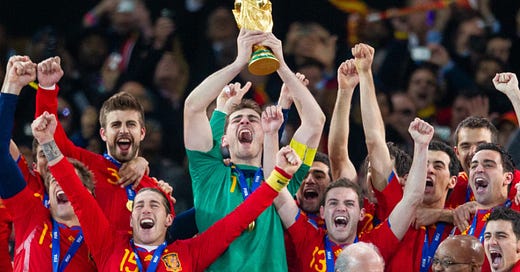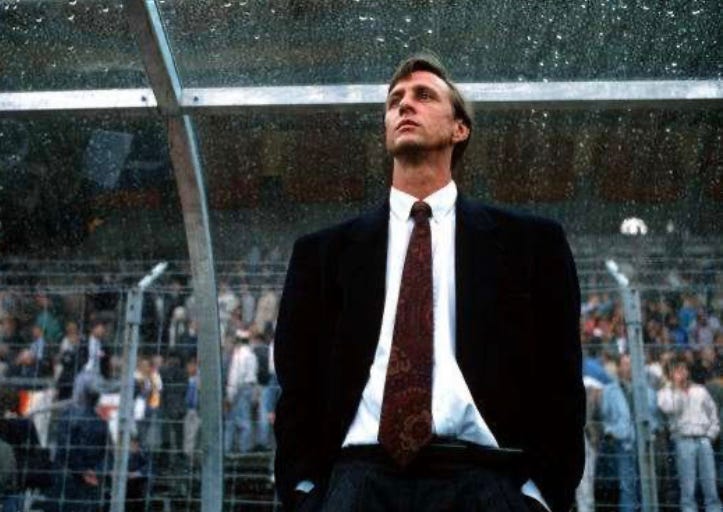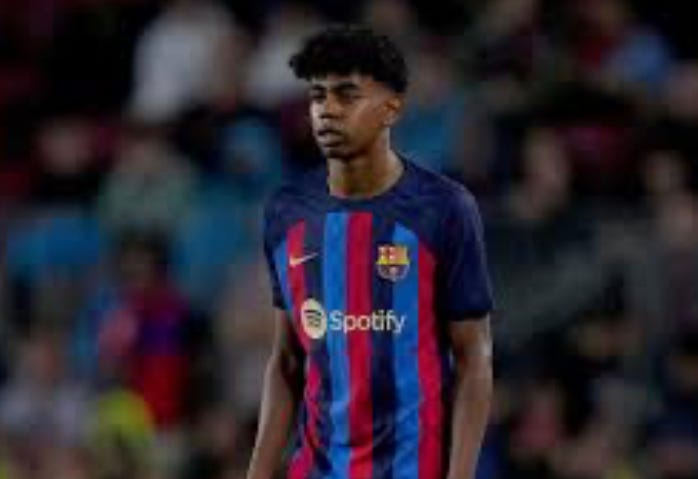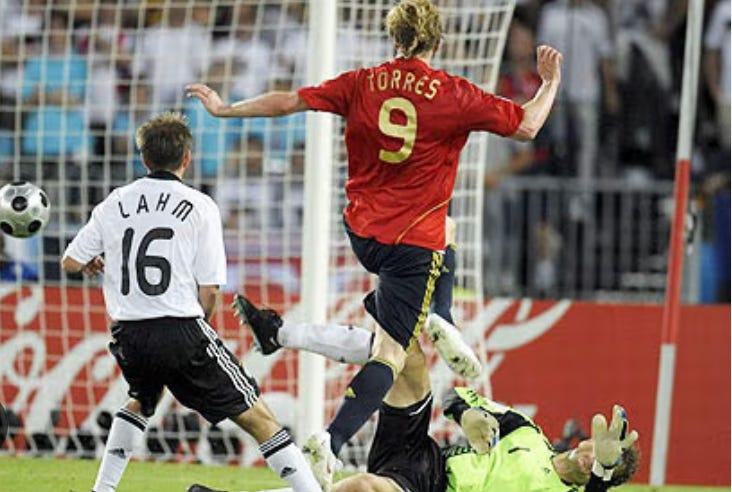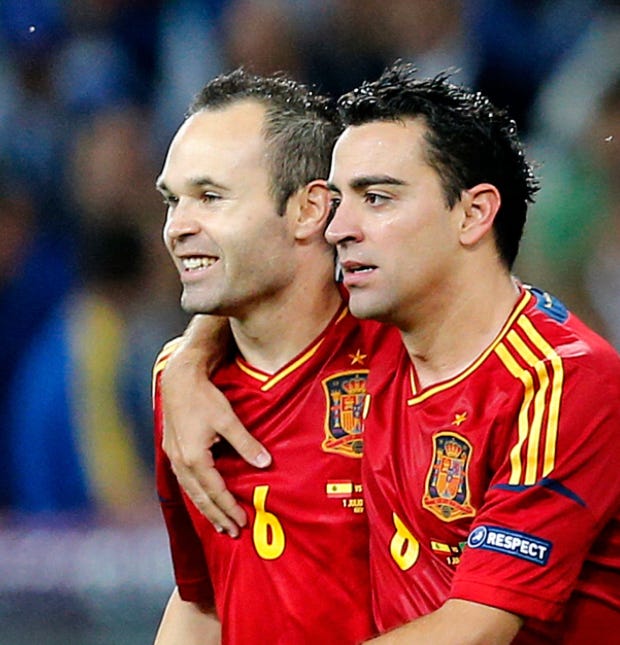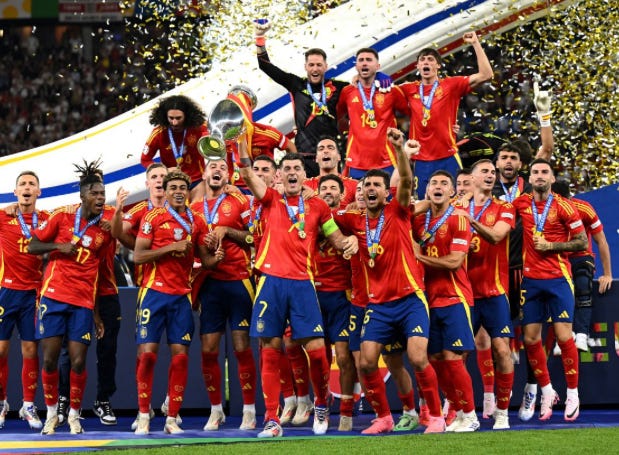Teams of the 21st Century: Spain
How did La Roja become the most dominant European national team of the last 25 years?
To supplement the 21st Century Greats series, I felt it was important to recognise teams that have enjoyed success over the last 25 years also. Sport is not just about individuals and, in many instances, the whole is definitely more important than the parts that make it up.
Teams of the 21st Century: Spain
Having won five major tournaments in the last 15 years, Spain are undoubtedly one of the most dominant national football teams of the 21st Century so far. Powered by their high pressure, possession based tiki-taka style, La Roja won an unprecedented three tournaments in a row between 2008 and 2012, had some time to rebuild, and then came back to win again.
If you asked anyone at the beginning of the century though, it would have been highly doubtful that they would have predicted such success. By 1998, Spain had fallen to an all-time low of 25th in the world rankings and had crashed out in the group stages of the World Cup that year after firstly beating defeated by Nigeria and then drawing with Paraguay. A 6-1 win in their final group game against Bulgaria was not enough to save them.
At this point, Spain were nowhere near the technical marvels that they would become. There were technically adept and brilliant players certainly like Raul and Luis Enrique but there were also the tough men of the past such as Fernando Hierro and Miguel Angel Nadal. Spanish football was starting its era of change but it certainly hadn’t been perfected yet.
The change in style was mostly instigated by one man, not a Spaniard but a Dutchman, Johan Cruyff. In the late ‘80s he had arrived at Barcelona with his Total Football, swept away the competition and forced a change in thinking across the board. In order to be successful, Spanish players would need to be more technically proficient and more capable of dominating games. This would need to be revamped at a national level.
This is exactly what was done and adaptations were made at all levels to ensure that young Spanish players were coached in the tactics that would eventually lead to tiki-taka. Change would not be imminent but it would produce great reward. As well as success at the senior level, the changes throughout the system have borne fruit at youth levels as well.
Since 1995 when the system was overhauled, Spain have won 21 tournaments at youth level (constituted here by anything that isn’t the full national team) including the Under-20 World Cup in 1999, the Under-21 Euros four times and the Under-23 gold medal at the Olympics in 2024. It goes without saying that many of the players that were successful within these teams, including the likes of Cesc Fabregas, Andres Iniesta, Xavi, Fernando Torres and David Silva, have then gone on to further success with the senior national team.
This is aligned with the further fact that La Liga teams have been incredibly willing over the years to give Spanish players the opportunity to play for the first team from a very young age. This has been particularly prevalent at Barcelona, who have had to make use of their academy system due to financial restraints and in recent years alone have blooded the likes of Gavi, Pedri, Pau Cubarsi, Alejandro Balde and of course Lamine Yamal. It is not just a Barcelona phenomenon though as Nico Williams played for Athletic Bilbao at 18 and it is also not new as Fernando Torres broke through for Atletico Madrid at just 17 in 2001. It seems if you are good enough then you play.
The beauty of having the same procedures all throughout the system is that very little changes for the players as they progress, except perhaps for the level of opposition that they are playing against. All they need to focus on is their own role and play as they always have. Consistency really is the key in this case. It is this that helped build a solid team that had very little to change for many years. It is also this that helped with the regeneration needed after retirements.
Once the system had bedded in, it was time for it to take effect. The national team had underperformed in the eyes of fans for too long considering the wealth of talent at their disposal. Veteran coach Luis Aragones took over in 2004 and soon realised that he needed to alter the style of play to best suit the type of players in his squad.
His players were not the most physically strong so in order to dominate games in the way that he wished, he determined that they would have to have the most possession. This is where tiki-taka came from, short passing and movement to control the ball and in turn the flow of the game as well. This built on the Total Football employed by Cruyff and his Dutch compatriots and put into effect the changes that had been developing. It revolutionised how football would be played in Spain both with respect to the national team and, famously, by Pep Guardiola at Barcelona.
After a positive group stage at the 2006 World Cup was swiftly ended by France in the Last 16, Spain were among the favourites for Euro 2008 but still cast by many as perennial underachievers. In a very attack minded tournament, La Roja beat the dangerous Russia, who they would meet again in the semi-finals, 4-1 in their opening match (with David Villa netting a hattrick). Following this they defeated both Sweden and Greece, scoring late winners in both games, to top their group and set up a quarter final with Italy.
In a somewhat dull contest that went against the norm for this edition of the competition, the teams drew 0-0 and the victor would be decided by a penalty shootout. Iker Casillas was the hero, saving two in a 4-2 Spanish win. They dispatched group rivals Russia 3-0 in the semi final with a commanding display marred only by an injury to David Villa and then moved on to face serial tournament winners Germany in the final.
This is the match that would prove to turn the tide in European football over the next four years or so. For so long, Spain had been unable to win these crucial matches whereas the Germans usually found a way. It was different this time though as the Spanish style that had been so carefully planned allowed them to dominate their opponents and win 1-0. Even with only a single goal in it, the result never really seemed in doubt and Spain broke their trophy drought of 44 years and gave themselves the confidence that they could win the big one.
That confidence pushed them forwards and over the next two tournaments the squad grew further together. Vicente Del Bosque took over but the tactics and team largely remained the same. In winning both the World Cup in 2010 and the next Euros in 2012 (they had even taken to often playing without a recognised striker at this point) Spain showed that they were not only proving their own belief that they were the best team in the world, and perhaps a generation, but also that they could finally overcome hurdles.
In 2010 they lost their opener against Switzerland and in 2012 drew their first game against Italy. In previous tournaments they may have panicked after dropping points early but this team were now different.
Invincibility cannot last forever though and Spain were firmly brought back down to Earth in the first game of their next major tournament, a 5-1 hammering at the hands of the Netherlands to open their World Cup 2014 campaign. This time there would be no bounce back and a 2-0 defeat to Chile was the final nail in the coffin.
The team had begun to change due to the natural passing of time. Carles Puyol retired from international football in 2013 and Xavi and Xabi Alonso followed the next year. They would soon be joined by Casillas and then Iniesta amongst others. It is never easy to lose a great player but to replace the entire backbone of a squad takes even more time.
Nevertheless the system remained and Spain kept faith in what had got them to the top in the first place. Results in major tournaments weren’t great (comparatively) for a while but new talent began to emerge that could be moulded to create the next great team. Manchester City’s Rodri would be a major part of this rebuild, having honed his craft in a Pep Guardiola team, but as always with Spain, it is not just about an individual but the team as a whole. Success depends on everyone playing their part.
Signs of hope were evident once more in reaching the semi-finals of the delayed Euros tournament in 2021 and then victory followed in the 2023 Nations League. After a shock 2-0 defeat to Scotland at the beginning of Euro 2024 qualifying, things started to come together again. Key players returned to the squad and a crop of incredibly talented youngsters, including the aforementioned Williams and Yamal, began to blossom at just the right time.
There is still an element of the tiki-taka style in terms of keeping possession of the ball, and there are a new generation of talented midfielders such as Fabian Ruiz and Pedri to utilise in this, but the system has also been evolved by current coach Luis de la Fuente to make the most of his current talents. The ball can often be fed out towards the wings where the devastating pace of the youngsters can cause real problems for opponents in behind.
Euro 2024 was like a perfect storm for Spain. They began with a fine 3-0 win over Croatia in what had potentially been a tricky tie on paper and didn’t slow down until they defeated England 2-1 in the final a month later. Highlights along the way included a 4-1 second round victory over the dangerous Georgia and Lamine Yamal’s wonderful goal against France in the semis. It was awesome to watch.
In winning they conceded only 4 goals, scored a record 15 and became the first side to win all seven of their games during the tournament. They never looked under any real threat and with an average age of 27 there is still plenty of life in this current Spanish squad. Indeed, they followed up with another impressive performance in the UEFA Nations League to top their group once again.
In the mid-nineties the Spanish football authorities took a calculated risk to transform the system from bottom to top. There was no guarantees that it was going to work but sometimes you need to take a bit of a gamble to be successful. Spain have become one of the most successful international teams in the world. Job well done.

